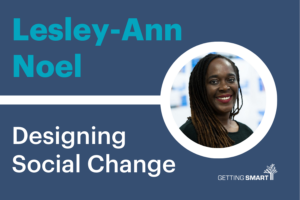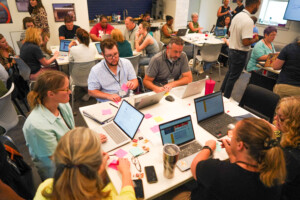Shifting to Competency-Based Education: A Tale of Three States

By Karla Phillips
There is momentum growing in states across the U.S. to replace the traditional, time-based education model with a system that is better designed to equip students for the demands of the modern workforce.
Our current system moves students through grade levels based primarily on their age, regardless of their depth of understanding. By not ensuring mastery, the current system can push students forward who are not yet ready, leaving them with gaps in critical knowledge or fundamental skills that must be remedied later. Concurrently, the traditional system often prevents students from excelling more quickly, engaging more deeply in their interests or pursuing additional academic challenges.
There are new, more learner-centered approaches that simultaneously address challenges with the current system and illuminate a promising path forward. Competency-based education (CBE and also referred to as mastery or proficiency-based) is a system where students advance to higher levels of learning when they demonstrate mastery of concepts and skills regardless of time, place or pace.
Shifting from the current system to one that is fully competency-based is comprehensive and can appear prohibitively complex. Each state has a unique policy landscape and political environment, and the path towards a competency-based system will reflect that.
Tale of Three States
Policy, Pilots and the Path to Competency-Based Education: A Tale of Three States, produced by ExcelinEd in partnership with Getting Smart, features the stories of how Idaho, Utah and Florida launched CBE pilot programs. The three featured states had the same goal, but took different paths.
While there is much variation in their stories, there are common themes that emerged and formed the basis of the report’s recommendations. These recommendations include prioritizing CBE communications and messaging, designing and passing pilot legislation and looking ahead to implementation.
CBE pilots provide a reasonable and actionable first step for policymakers and empower and embolden innovative school and district educators and leaders. This report seeks to inspire other states to implement pilots as a first step on the path to competency-based education.
Future research efforts will focus more in-depth on the pilot implementation efforts and a greater review of supportive policies as well as unique state solution examples.
For more information on these resources and others, see ExcelinEd’s Competency-Based Education Resource Page. There are also resources specifically designed for state use, such as CBE Fundamental Principles, Policy Summary, Innovation Pilot Model Legislation and a CBE Communications Toolkit.
Register now for ExcelinEd’s National Summit on Education Reform held November 30th – December 2nd, 2016 in Washington, D.C.
For more, see:
- Policy, Pilots and the Path to Competency-Based Education: A Tale of Three States
- 4 Strategic Decisions to Take When Planning a Competency-Based Education Program
- 3 Smart State Approaches to Competency-Based Education
Karla Phillips is Policy Director at the Foundation for Excellence in Education. Follow her on Twitter: @azkarla
Stay in-the-know with all things EdTech and innovations in learning by signing up to receive the weekly Smart Update. This post includes mentions of a Getting Smart partner. For a full list of partners, affiliate organizations and all other disclosures please see our Partner page.



0 Comments
Leave a Comment
Your email address will not be published. All fields are required.